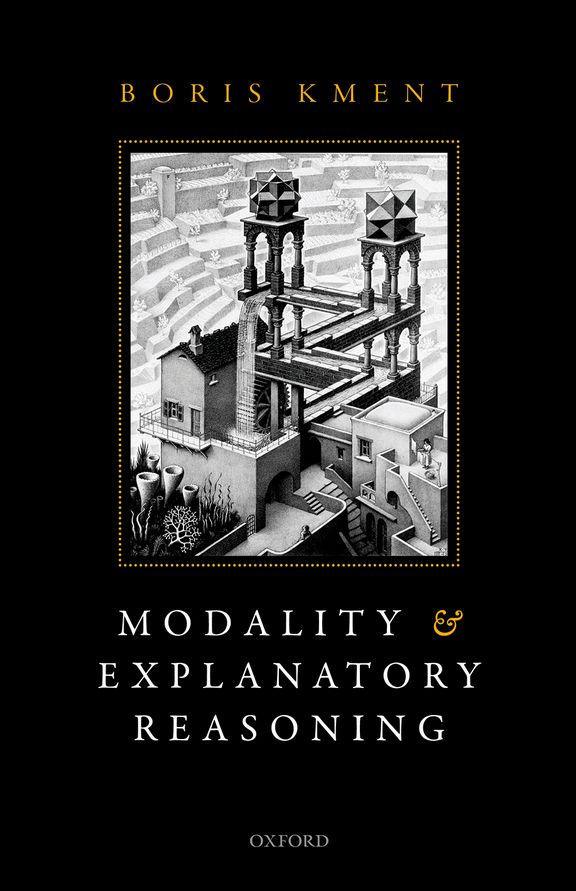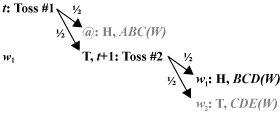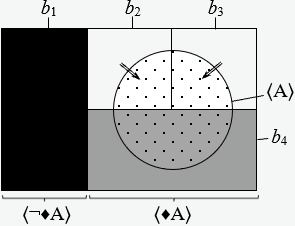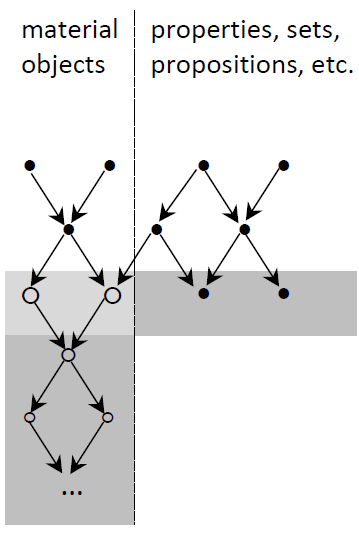Book

Modality and Explanatory Reasoning
Oxford University Press, 2014
Abstract. Since the ground-breaking work of Saul Kripke, David Lewis and others in the 1960’s and 70’s, one dominant interest of analytic philosophers has been in modal truths, which concern the question what is possible and what is necessary. However, there is considerable controversy over the source and nature of necessity. This book takes a novel approach to the study of modality that places special emphasis on understanding the origin of modal notions in everyday thought.
Kment argues that the concepts of necessity and possibility originated as useful ancillaries to a common type of thought experiment—counterfactual reasoning—that allows us to investigate explanatory connections. This cognitive routine is closely related to the controlled experiments of empirical science. Necessity is defined in terms of causation and other forms of explanation such as grounding, a relation that connects metaphysically fundamental facts to non-fundamental ones. Therefore, contrary to a widespread view, explanation is more fundamental than modality. The study of modal facts is important for philosophy, not because these facts are of much metaphysical interest in their own right, but because they provide evidence about explanatory relationships.
In the course of developing this position, the book offers new accounts of possible and impossible worlds, counterfactual conditionals, essential truths and their role in grounding, and a novel theory of how counterfactuals relate to causation and explanation.
Read Chapter 1
Download chapters from Oxford Scholarship Online.
Order a hardcopy from Amazon US, Amazon UK, Amazon Canada, Amazon Australia, Amazon Japan, Amazon France, Amazon Italy, Amazon Germany.
Download the Kindle edition from Amazon US, Amazon UK, Amazon Canada, Amazon Australia, Amazon Japan, Amazon France, Amazon Italy, Amazon Germany.
Oxford University Press, 2014
Abstract. Since the ground-breaking work of Saul Kripke, David Lewis and others in the 1960’s and 70’s, one dominant interest of analytic philosophers has been in modal truths, which concern the question what is possible and what is necessary. However, there is considerable controversy over the source and nature of necessity. This book takes a novel approach to the study of modality that places special emphasis on understanding the origin of modal notions in everyday thought.
Kment argues that the concepts of necessity and possibility originated as useful ancillaries to a common type of thought experiment—counterfactual reasoning—that allows us to investigate explanatory connections. This cognitive routine is closely related to the controlled experiments of empirical science. Necessity is defined in terms of causation and other forms of explanation such as grounding, a relation that connects metaphysically fundamental facts to non-fundamental ones. Therefore, contrary to a widespread view, explanation is more fundamental than modality. The study of modal facts is important for philosophy, not because these facts are of much metaphysical interest in their own right, but because they provide evidence about explanatory relationships.
In the course of developing this position, the book offers new accounts of possible and impossible worlds, counterfactual conditionals, essential truths and their role in grounding, and a novel theory of how counterfactuals relate to causation and explanation.
Read Chapter 1
Download chapters from Oxford Scholarship Online.
Order a hardcopy from Amazon US, Amazon UK, Amazon Canada, Amazon Australia, Amazon Japan, Amazon France, Amazon Italy, Amazon Germany.
Download the Kindle edition from Amazon US, Amazon UK, Amazon Canada, Amazon Australia, Amazon Japan, Amazon France, Amazon Italy, Amazon Germany.
Book Symposia on Modality and Explanatory Reasoning

Analysis book symposium with Nina Emery, Christopher Hill, Cian Dorr, and Stephen Yablo
Analysis 77, 2017, pp. 129–88.
Summary of Modality and Explanatory Reasoning
Nina Emery and Christopher Hill, “Impossible Worlds and Metaphysical
Explanation: Comments on Kment’s Modality and Explanatory Reasoning”
Cian Dorr, “Contingent Existence and Iterated Modality”
Stephen Yablo, “Kment on Counterfactuals”
Reply to Emery and Hill, Dorr, and Yablo
Analysis 77, 2017, pp. 129–88.
Summary of Modality and Explanatory Reasoning
Nina Emery and Christopher Hill, “Impossible Worlds and Metaphysical
Explanation: Comments on Kment’s Modality and Explanatory Reasoning”
Cian Dorr, “Contingent Existence and Iterated Modality”
Stephen Yablo, “Kment on Counterfactuals”
Reply to Emery and Hill, Dorr, and Yablo

Philosophy and Phenomenological Research book symposium with Meghan Sullivan and Marc Lange
Philosophy and Phenomenological Research 91, 2015, pp. 489–539.
Précis of Modality and Explanatory Reasoning
Meghan Sullivan, “The Irrelevance of Essence”
Marc Lange, “Comments on Kment's Modality and Explanatory Reasoning”
Reply to Sullivan and Lange
Philosophy and Phenomenological Research 91, 2015, pp. 489–539.
Précis of Modality and Explanatory Reasoning
Meghan Sullivan, “The Irrelevance of Essence”
Marc Lange, “Comments on Kment's Modality and Explanatory Reasoning”
Reply to Sullivan and Lange

Reviews of Modality and Explanatory Reasoning
Barry Ward, “Modality and Explanatory Reasoning, by Boris Kment,”
Australasian Journal of Philosophy 94, 2016, pp. 399–402.
Richard Baron, “Modality and Explanatory Reasoning, by Boris Kment,”
Philosophy Now
Daniel Vecchio, “Boris Kment, Modality and Explanatory Reasoning,”
Polish Journal of Philosophy 9, 2015, pp. 116–120.
Australasian Journal of Philosophy 94, 2016, pp. 399–402.
Richard Baron, “Modality and Explanatory Reasoning, by Boris Kment,”
Philosophy Now
Daniel Vecchio, “Boris Kment, Modality and Explanatory Reasoning,”
Polish Journal of Philosophy 9, 2015, pp. 116–120.
Selected Papers

Decision, Causality, and Predetermination
Forthcoming in Philosophy and Phenomenological Research.
Abstract.Evidential decision theory (EDT) says that the choiceworthiness of an option depends on its evidential connections to possible outcomes. Causal decision theory (CDT) holds that it depends on your beliefs about its causal connections. While Newcomb cases support CDT, Arif Ahmed has described examples that support EDT. A new account is needed to get all cases right. I argue that an option A’s choiceworthiness is determined by the probability that a good outcome ensues at possible A-worlds that match actuality in the facts causally unaffected by your decision (the “unaffected facts”). Moreover, you should evaluate A on the assumption that A is compossible with the unaffected facts. This view entails that you should use EDT when evaluating A on the assumption that the unaffected facts determine your action, but use CDT when assessing A on the opposite assumption. A’s choiceworthiness equals a weighted average of these conditional assessments. The weights are determined by your beliefs about whether the unaffected fact determine your action. This account gets both Newcomb and Ahmed cases right. According to an influential view, whether you take the unaffected facts to determine your action can make a difference to whether you can regard yourself as free and the action as being under your control. While my account is neutral on this issue, it entails that whether you take the unaffected facts to determine your action is important in a different way: it matters to whether you should follow EDT or CDT.
Read the paper.
Forthcoming in Philosophy and Phenomenological Research.
Abstract.Evidential decision theory (EDT) says that the choiceworthiness of an option depends on its evidential connections to possible outcomes. Causal decision theory (CDT) holds that it depends on your beliefs about its causal connections. While Newcomb cases support CDT, Arif Ahmed has described examples that support EDT. A new account is needed to get all cases right. I argue that an option A’s choiceworthiness is determined by the probability that a good outcome ensues at possible A-worlds that match actuality in the facts causally unaffected by your decision (the “unaffected facts”). Moreover, you should evaluate A on the assumption that A is compossible with the unaffected facts. This view entails that you should use EDT when evaluating A on the assumption that the unaffected facts determine your action, but use CDT when assessing A on the opposite assumption. A’s choiceworthiness equals a weighted average of these conditional assessments. The weights are determined by your beliefs about whether the unaffected fact determine your action. This account gets both Newcomb and Ahmed cases right. According to an influential view, whether you take the unaffected facts to determine your action can make a difference to whether you can regard yourself as free and the action as being under your control. While my account is neutral on this issue, it entails that whether you take the unaffected facts to determine your action is important in a different way: it matters to whether you should follow EDT or CDT.
Read the paper.

Russell-Myhill and Grounding
Analysis, 2021.
Abstract. The Russell-Myhill paradox (RMP) puts pressure on the Russellian structured view of propositions (structurism) by showing that it conflicts with certain prima facie attractive ontological and logical principles. I describe several versions of RMP and argue that structurists can appeal to natural assumptions about metaphysical grounding to provide independent reasons for rejecting the ontological principles used in these paradoxes. It remains a task for future work to extend this grounding-based approach to all variants of RMP.
Read the paper.
Analysis, 2021.
Abstract. The Russell-Myhill paradox (RMP) puts pressure on the Russellian structured view of propositions (structurism) by showing that it conflicts with certain prima facie attractive ontological and logical principles. I describe several versions of RMP and argue that structurists can appeal to natural assumptions about metaphysical grounding to provide independent reasons for rejecting the ontological principles used in these paradoxes. It remains a task for future work to extend this grounding-based approach to all variants of RMP.
Read the paper.

Modality, Worlds, Essence, and Modal Knowledge
to appear in Epistemology of Modality and Philosophical Methodology, ed. by A. Vaidya and D. Prelevic, Routledge.
Abstract.A theory of what it is for a proposition to be metaphysical necessary should satisfy a number of desiderata. Among other things, it should account for the characteristic connections between metaphysical modality and various other philosophically important notions, and it should explain how it is possible for us to possess the modal knowledge we have. I describe the links between modal concepts and three other concepts (possible worlds, counterfactuals, and essence). It is tempting to try to exploit the connections between modality and these other notions to give an illuminating account of necessity. However, existing attempts to do so face significant limitations. I will draw on previous work to propose a theory of modality that can shed light on the conceptual connections. Moreover, I will argue that my account yields an attractive explanation of how modal knowledge is possible.
Read the paper.
to appear in Epistemology of Modality and Philosophical Methodology, ed. by A. Vaidya and D. Prelevic, Routledge.
Abstract.A theory of what it is for a proposition to be metaphysical necessary should satisfy a number of desiderata. Among other things, it should account for the characteristic connections between metaphysical modality and various other philosophically important notions, and it should explain how it is possible for us to possess the modal knowledge we have. I describe the links between modal concepts and three other concepts (possible worlds, counterfactuals, and essence). It is tempting to try to exploit the connections between modality and these other notions to give an illuminating account of necessity. However, existing attempts to do so face significant limitations. I will draw on previous work to propose a theory of modality that can shed light on the conceptual connections. Moreover, I will argue that my account yields an attractive explanation of how modal knowledge is possible.
Read the paper.

Essence and Modal Knowledge
Synthese 198, 2021, pp. 1957–79.
Abstract. During the last quarter of a century, a number of philosophers have become attracted to the idea that necessity can be analyzed in terms of a hyperintensional notion of essence. One challenge for proponents of this view is to give a plausible explanation of our modal knowledge. The goal of this paper is to develop a strategy for meeting this challenge. My approach rests on an account of modality that I developed in previous work, and which analyzes modal properties in terms of the notion of a metaphysical law (which is a generalization of the concept of an essential truth). I discuss what information about the metaphysical laws (including essential truths) is required for modal knowledge. Moreover, I describe two ways in which we might be able to acquire this information. The first way employs inference to the best explanation. The metaphysical laws, including the essential truths, play a crucial role in causal and grounding explanations and we can gain knowledge of these laws by abductive inferences from facts of which we have perceptual or a priori knowledge. The second way of gaining information about the metaphysical laws rests on knowledge that is partly constitutive of competence with the concepts that are needed to express the relevant information. Finally, I consider how knowledge of the metaphysical laws can be used to establish modal claims, paying special attention to the much-discussed connection between conceiving and possibility.
Read the paper.
Synthese 198, 2021, pp. 1957–79.
Abstract. During the last quarter of a century, a number of philosophers have become attracted to the idea that necessity can be analyzed in terms of a hyperintensional notion of essence. One challenge for proponents of this view is to give a plausible explanation of our modal knowledge. The goal of this paper is to develop a strategy for meeting this challenge. My approach rests on an account of modality that I developed in previous work, and which analyzes modal properties in terms of the notion of a metaphysical law (which is a generalization of the concept of an essential truth). I discuss what information about the metaphysical laws (including essential truths) is required for modal knowledge. Moreover, I describe two ways in which we might be able to acquire this information. The first way employs inference to the best explanation. The metaphysical laws, including the essential truths, play a crucial role in causal and grounding explanations and we can gain knowledge of these laws by abductive inferences from facts of which we have perceptual or a priori knowledge. The second way of gaining information about the metaphysical laws rests on knowledge that is partly constitutive of competence with the concepts that are needed to express the relevant information. Finally, I consider how knowledge of the metaphysical laws can be used to establish modal claims, paying special attention to the much-discussed connection between conceiving and possibility.
Read the paper.

Free Will and Ultimate Explanation
Philosophical Issues 27, 2017, pp. 114–30.
Abstract. Many philosophers and non-philosophers who reflect on the causal antecedents of human action get the impression that no agent can have morally relevant freedom. Call this the ‘non-existence impression.’ The paper aims to understand the (often implicit) reasoning underlying this impression. On the most popular reconstructions, the reasoning relies on the assumption that either an action is the outcome of a chance process, or it is determined by factors that are beyond the agent’s control or which she did not bring about. I argue that arguments based on this premise fail to apply to some possible agents for whom the non-existence impression arises. On the alternative reconstruction I offer, the impression rests on the assumption that free will requires being involved in the ultimate explanation of one’s actions in a novel sense in which nothing can be involved in the ultimate explanation of anything.
Read the paper.
Philosophical Issues 27, 2017, pp. 114–30.
Abstract. Many philosophers and non-philosophers who reflect on the causal antecedents of human action get the impression that no agent can have morally relevant freedom. Call this the ‘non-existence impression.’ The paper aims to understand the (often implicit) reasoning underlying this impression. On the most popular reconstructions, the reasoning relies on the assumption that either an action is the outcome of a chance process, or it is determined by factors that are beyond the agent’s control or which she did not bring about. I argue that arguments based on this premise fail to apply to some possible agents for whom the non-existence impression arises. On the alternative reconstruction I offer, the impression rests on the assumption that free will requires being involved in the ultimate explanation of one’s actions in a novel sense in which nothing can be involved in the ultimate explanation of anything.
Read the paper.

De Re Modality.
In Routledge Handbook of Modality, ed. by Otávio Bueno and Scott Shalkowski, London and New York: Routledge, 2020, pp. 70–81.
Abstract.An article on de re modality that expands on my views on this topic.
Read the paper.
In Routledge Handbook of Modality, ed. by Otávio Bueno and Scott Shalkowski, London and New York: Routledge, 2020, pp. 70–81.
Abstract.An article on de re modality that expands on my views on this topic.
Read the paper.

Counterfactuals and Causal Reasoning
In Elitzur Siegal and Nora Boneh (eds.), Perspectives on Causation, Springer, 2020, pp. 463–82.
Abstract.Counterfactual conditionals are used extensively in causal reasoning. This observation has motivated a philosophical tradition that aims to provide a counterfactual analysis of causation. However, such analyses have come under pressure from a proliferation of counterexamples and from evidence that suggests that the truth-conditions of counterfactuals are themselves causal. I offer an alternative account of the role of counterfactuals in causal thought that is consistent with these data: counterfactuals are used in a common method of causal reasoning related to John Stuart Mill's method of difference. The method uses background beliefs about causal relationships, history, and the natural laws to establish a new causal claim. Counterfactuals serve as a convenient tool for stating certain intermediate conclusions in this reasoning procedure, and that is one of the reasons why we have a counterfactual construction. This account yields a functional explanation of why our language contains a construction with the truth-conditions of counterfactuals.
Read the paper.
In Elitzur Siegal and Nora Boneh (eds.), Perspectives on Causation, Springer, 2020, pp. 463–82.
Abstract.Counterfactual conditionals are used extensively in causal reasoning. This observation has motivated a philosophical tradition that aims to provide a counterfactual analysis of causation. However, such analyses have come under pressure from a proliferation of counterexamples and from evidence that suggests that the truth-conditions of counterfactuals are themselves causal. I offer an alternative account of the role of counterfactuals in causal thought that is consistent with these data: counterfactuals are used in a common method of causal reasoning related to John Stuart Mill's method of difference. The method uses background beliefs about causal relationships, history, and the natural laws to establish a new causal claim. Counterfactuals serve as a convenient tool for stating certain intermediate conclusions in this reasoning procedure, and that is one of the reasons why we have a counterfactual construction. This account yields a functional explanation of why our language contains a construction with the truth-conditions of counterfactuals.
Read the paper.

Chance and the Structure of Modal Space
Mind 127, pp. 633–65.
Abstract. The sample space of the chance distribution at a given time is a class of possible world. Thanks to this connection between chance and modality, one’s views about modal space can have significant consequences in the theory of chance and can be evaluated in part by how plausible these implications are. I apply this methodology to evaluate certain forms of modal contingentism, the thesis that some facts about what is possible are contingent. Any modal contingentist view that meets certain conditions generates difficulties in the philosophy of chance, including a problem usually associated with Humeanism that is known as ‘the problem of undermining futures.’ I consider two well-known versions of modal contingentism that face this difficulty. The first version, proposed by Hugh Chandler and Nathan Salmon, rests on an argument for the claim that many individuals have their modal features contingently. The second version is motivated by the thesis that the existence of a possible world depends on the existence of the contingent individuals inhabiting it, and that many worlds are therefore contingent existents.
Read the paper.
Mind 127, pp. 633–65.
Abstract. The sample space of the chance distribution at a given time is a class of possible world. Thanks to this connection between chance and modality, one’s views about modal space can have significant consequences in the theory of chance and can be evaluated in part by how plausible these implications are. I apply this methodology to evaluate certain forms of modal contingentism, the thesis that some facts about what is possible are contingent. Any modal contingentist view that meets certain conditions generates difficulties in the philosophy of chance, including a problem usually associated with Humeanism that is known as ‘the problem of undermining futures.’ I consider two well-known versions of modal contingentism that face this difficulty. The first version, proposed by Hugh Chandler and Nathan Salmon, rests on an argument for the claim that many individuals have their modal features contingently. The second version is motivated by the thesis that the existence of a possible world depends on the existence of the contingent individuals inhabiting it, and that many worlds are therefore contingent existents.
Read the paper.
Model Theory and Contingent Existence
Analysis 76, 2016, pp. 172–190.
This paper was written as a contribution to a book symposium on Timothy Williamson’s Modal Logic as Metaphysics. It sketches a non-instrumentalist interpretation of the possible-world semantics for modal logic that is compatible with contingentism, i.e. with the view that it is possible for there to be contingent existents.
Read the paper.
Read Williamson’s Reply
Analysis 76, 2016, pp. 172–190.
This paper was written as a contribution to a book symposium on Timothy Williamson’s Modal Logic as Metaphysics. It sketches a non-instrumentalist interpretation of the possible-world semantics for modal logic that is compatible with contingentism, i.e. with the view that it is possible for there to be contingent existents.
Read the paper.
Read Williamson’s Reply

Modality, Metaphysics, and Method
The Palgrave Handbook of Philosophical Methods, ed. by C. Daly, Palgrave/Macmillan, pp. 179–207.
Abstract. During the last couple of decades metaphysicians have often used modal notions (necessity, possible worlds, counterfactuals, etc.) in theories about numerous topics (e.g., causation, explanation, essence, relative fundamentality). Since such accounts have generally not fared very well, some philosophers have recently concluded that the focal place in metaphysical theories often occupied by modality rightly belongs to such concepts as grounding, essence, and fundamentality. While I am sympathetic to this shift of focus from the modal to the explanatory domain, I also think it is possible to explain and justify the extensive use of modal considerations in many areas of thought whose ultimate concern is with explanation. The paper aims to give such an explanation by applying the theoretical framework developed in my book Modality and Explanatory Reasoning (Oxford UP, 2014). On the account given in this book, modal facts often reflect explanatory relationships or facts that are of interest because of their importance to explanation. Consequently, it is often possible to evaluate a metaphysical thesis about explanatory connections (or related matters) by its consistency with the modal facts and its ability to explain them. In these cases, modal facts are not the ultimate targets of the investigation, but are of interest solely in their role as evidence. I use three case studies to make this idea more concrete: the evaluation of philosophical analyses by the method of cases, the role of supervenience theses in debates about the relative fundamentality of different classes of facts, and the function of counterfactuals in explanatory reasoning.
Read the paper.
The Palgrave Handbook of Philosophical Methods, ed. by C. Daly, Palgrave/Macmillan, pp. 179–207.
Abstract. During the last couple of decades metaphysicians have often used modal notions (necessity, possible worlds, counterfactuals, etc.) in theories about numerous topics (e.g., causation, explanation, essence, relative fundamentality). Since such accounts have generally not fared very well, some philosophers have recently concluded that the focal place in metaphysical theories often occupied by modality rightly belongs to such concepts as grounding, essence, and fundamentality. While I am sympathetic to this shift of focus from the modal to the explanatory domain, I also think it is possible to explain and justify the extensive use of modal considerations in many areas of thought whose ultimate concern is with explanation. The paper aims to give such an explanation by applying the theoretical framework developed in my book Modality and Explanatory Reasoning (Oxford UP, 2014). On the account given in this book, modal facts often reflect explanatory relationships or facts that are of interest because of their importance to explanation. Consequently, it is often possible to evaluate a metaphysical thesis about explanatory connections (or related matters) by its consistency with the modal facts and its ability to explain them. In these cases, modal facts are not the ultimate targets of the investigation, but are of interest solely in their role as evidence. I use three case studies to make this idea more concrete: the evaluation of philosophical analyses by the method of cases, the role of supervenience theses in debates about the relative fundamentality of different classes of facts, and the function of counterfactuals in explanatory reasoning.
Read the paper.

Haecceitism, Chance, and Counterfactuals
Philosophical Review 121, 2012, pp. 573–609.
Abstract. Anti-haecceitists believe that all facts about specific individuals—such as the fact that Fred exists, or that Katie is tall—globally supervene on purely qualitative facts. Haecceitists deny that. The issue is not only of interest in itself, but receives additional importance from its intimate connection to the question of whether all fundamental facts are qualitative or whether they include facts about which specific individuals there are and how qualitative properties and relations are distributed over them. Those who think that all fundamental facts are qualitative are arguably committed to anti-haecceitism. The goal of this paper is to point out some problems for anti-haecceitism (and therefore for the thesis that all fundamental facts are qualitative). I focus on two common assumptions about possible worlds: (i) Sets of possible worlds are the bearers of objective physical chance. (ii) Counterfactual conditionals can be defined by appeal to a relation of closeness between possible worlds. And I try to show that absurd consequences ensue if either of these assumptions is combined with anti-haecceitism.
Read the paper.
Philosophical Review 121, 2012, pp. 573–609.
Abstract. Anti-haecceitists believe that all facts about specific individuals—such as the fact that Fred exists, or that Katie is tall—globally supervene on purely qualitative facts. Haecceitists deny that. The issue is not only of interest in itself, but receives additional importance from its intimate connection to the question of whether all fundamental facts are qualitative or whether they include facts about which specific individuals there are and how qualitative properties and relations are distributed over them. Those who think that all fundamental facts are qualitative are arguably committed to anti-haecceitism. The goal of this paper is to point out some problems for anti-haecceitism (and therefore for the thesis that all fundamental facts are qualitative). I focus on two common assumptions about possible worlds: (i) Sets of possible worlds are the bearers of objective physical chance. (ii) Counterfactual conditionals can be defined by appeal to a relation of closeness between possible worlds. And I try to show that absurd consequences ensue if either of these assumptions is combined with anti-haecceitism.
Read the paper.

Varieties of Modality
Stanford Encyclopedia of Philosophy, published in 2012, last updated in 2021
Abstract. Modal statements come in many different kinds. This article discusses some of the main issues that need to be addressed by anyone trying to give a systematic and unified account of this multiplicity of modal notions. Are there separate forms of modality that are tied to the epistemic and the metaphysical domains? Is there a special kind of necessity associated with the laws of nature? Can some notions of necessity be reduced to others that are more fundamental? If so, which are the most fundamental ones? And if there are several fundamental kinds of necessity, what do they have in common that makes them all kinds of necessity?
Read the article.
Stanford Encyclopedia of Philosophy, published in 2012, last updated in 2021
Abstract. Modal statements come in many different kinds. This article discusses some of the main issues that need to be addressed by anyone trying to give a systematic and unified account of this multiplicity of modal notions. Are there separate forms of modality that are tied to the epistemic and the metaphysical domains? Is there a special kind of necessity associated with the laws of nature? Can some notions of necessity be reduced to others that are more fundamental? If so, which are the most fundamental ones? And if there are several fundamental kinds of necessity, what do they have in common that makes them all kinds of necessity?
Read the article.

Causation: Determination and Difference-Making
Noûs 44(1), 2010, pp. 80–111.
Abstract. Much of the modern philosophy of causation has been governed by two ideas: (i) causes make their effects inevitable; (ii) a cause is something that makes a difference to whether its effect occurs. I focus on explaining the origin of idea (ii) and its connection to (i). On my view, the frequent attempts to turn (ii) into an analysis of causation are wrongheaded. Patterns of difference-making aren't what makes causal claims true. They merely provide a useful test for causal claims. Moreover, what justifies us in using them as a test is idea (i). That's how (i) and (ii) are connected.
Read the paper.
Noûs 44(1), 2010, pp. 80–111.
Abstract. Much of the modern philosophy of causation has been governed by two ideas: (i) causes make their effects inevitable; (ii) a cause is something that makes a difference to whether its effect occurs. I focus on explaining the origin of idea (ii) and its connection to (i). On my view, the frequent attempts to turn (ii) into an analysis of causation are wrongheaded. Patterns of difference-making aren't what makes causal claims true. They merely provide a useful test for causal claims. Moreover, what justifies us in using them as a test is idea (i). That's how (i) and (ii) are connected.
Read the paper.

Counterfactuals and Explanation
Mind 115, 2006, pp. 261–310.
Abstract. On the received view, counterfactuals are analyzed using the concept of closeness between possible worlds: 'If it had been the case that p, then it would have been the case that q' is true at world w just in case q is true at all the possible p-worlds closest to w. The degree of closeness between two worlds is usually thought to be determined by weighting different respects of similarity between them. The question I consider in the paper is which weights attach to different respects of similarity. I start by considering Lewis's answer to the question and argue against it by presenting several counterexamples. I use the same examples to motivate a general principle about closeness: if a fact obtains in both of two worlds, then this similarity is relevant to the closeness between them if and only if the fact has the same explanation in the two worlds. I use this principle and some ideas of Lewis's to formulate a general account of counterfactuals, and I argue that this account can explain the asymmetry of counterfactual dependence. The paper concludes with a discussion of some examples that cannot be accommodated by the present version of the account and therefore necessitate further work on the details.
Read the paper.
Mind 115, 2006, pp. 261–310.
Abstract. On the received view, counterfactuals are analyzed using the concept of closeness between possible worlds: 'If it had been the case that p, then it would have been the case that q' is true at world w just in case q is true at all the possible p-worlds closest to w. The degree of closeness between two worlds is usually thought to be determined by weighting different respects of similarity between them. The question I consider in the paper is which weights attach to different respects of similarity. I start by considering Lewis's answer to the question and argue against it by presenting several counterexamples. I use the same examples to motivate a general principle about closeness: if a fact obtains in both of two worlds, then this similarity is relevant to the closeness between them if and only if the fact has the same explanation in the two worlds. I use this principle and some ideas of Lewis's to formulate a general account of counterfactuals, and I argue that this account can explain the asymmetry of counterfactual dependence. The paper concludes with a discussion of some examples that cannot be accommodated by the present version of the account and therefore necessitate further work on the details.
Read the paper.

Counterfactuals and the Analysis of Necessity
Philosophical Perspectives 20, 2006, pp. 237–302.
Abstract. The goal of this paper is to give an account of what it is for a proposition to be metaphysically necessary, and an explanation of the raison d'être of modal concepts. Both projects have their starting point in the idea that modal notions originate in our cognitive practice of counterfactual reasoning, i.e. of answering questions of the form 'how would things be different if such-and-such were the case'.
Read the paper.
Philosophical Perspectives 20, 2006, pp. 237–302.
Abstract. The goal of this paper is to give an account of what it is for a proposition to be metaphysically necessary, and an explanation of the raison d'être of modal concepts. Both projects have their starting point in the idea that modal notions originate in our cognitive practice of counterfactual reasoning, i.e. of answering questions of the form 'how would things be different if such-and-such were the case'.
Read the paper.

